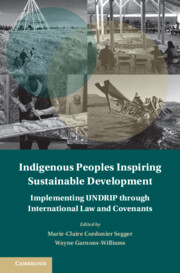Refine search
Actions for selected content:
330 results
Introduction
-
- Book:
- Sarah Wambaugh and the Plebiscite
- Published online:
- 23 December 2025
- Print publication:
- 19 February 2026, pp 1-19
-
- Chapter
- Export citation
2 - Indigenous Peoples Rights in ILO 169 and UNDRIP
- from Part II - Foundations of International Law for Indigenous Peoples and Sustainable Development
-
- Book:
- Indigenous Peoples Inspiring Sustainable Development
- Published online:
- 07 January 2026
- Print publication:
- 19 February 2026, pp 15-31
-
- Chapter
- Export citation
8 - Extractive Industries, Sustainable Development, and Indigenous Treaty Law
- from Part III - Indigenous Treaty Law Innovations on Sustainable Development
-
- Book:
- Indigenous Peoples Inspiring Sustainable Development
- Published online:
- 07 January 2026
- Print publication:
- 19 February 2026, pp 156-180
-
- Chapter
- Export citation
14 - UNDRIP Principles and Sustainability Innovations in Indigenous Trade Rules
- from Part V - Conclusions and Lessons for Treaty Reform
-
- Book:
- Indigenous Peoples Inspiring Sustainable Development
- Published online:
- 07 January 2026
- Print publication:
- 19 February 2026, pp 289-308
-
- Chapter
- Export citation
13 - Rights of Indigenous Peoples to Advance SDGs in Bangladesh and Mexico
- from Part IV - Indigenous Treaty Implementation for Sustainable Development in Key Countries
-
- Book:
- Indigenous Peoples Inspiring Sustainable Development
- Published online:
- 07 January 2026
- Print publication:
- 19 February 2026, pp 269-286
-
- Chapter
- Export citation
Conclusion
-
- Book:
- Sarah Wambaugh and the Plebiscite
- Published online:
- 23 December 2025
- Print publication:
- 19 February 2026, pp 273-276
-
- Chapter
- Export citation
12 - Indigenous Treaties for Sustainable Development in the Andes
- from Part IV - Indigenous Treaty Implementation for Sustainable Development in Key Countries
-
- Book:
- Indigenous Peoples Inspiring Sustainable Development
- Published online:
- 07 January 2026
- Print publication:
- 19 February 2026, pp 250-268
-
- Chapter
- Export citation
Chapter 19 - Who Controls the Medical Technology Placed in Our Bodies?
-
-
- Book:
- Complex Ethics Consultations
- Published online:
- 22 December 2025
- Print publication:
- 22 January 2026, pp 129-134
-
- Chapter
- Export citation
7 - “Popular Sovereignty” and the Declaration of Independence
-
-
- Book:
- The Cambridge Companion to the Declaration of Independence
- Published online:
- 18 December 2025
- Print publication:
- 22 January 2026, pp 90-108
-
- Chapter
- Export citation
5 - The Right to Mental Self-Determination
- from Part II - The Positive Dimension
-
- Book:
- Minds, Freedoms and Rights
- Published online:
- 21 December 2025
- Print publication:
- 22 January 2026, pp 111-133
-
- Chapter
-
- You have access
- Open access
- HTML
- Export citation
The Importance of Place and Materiality in the Decolonisation of African History through UNESCO’s General History of Africa (1962-1998)
-
- Journal:
- Itinerario , First View
- Published online by Cambridge University Press:
- 09 January 2026, pp. 1-14
-
- Article
-
- You have access
- Open access
- HTML
- Export citation
2 - Self-Determination through Regional Authority
-
- Book:
- New Regional Authorities
- Published online:
- 17 December 2025
- Print publication:
- 08 January 2026, pp 33-61
-
- Chapter
- Export citation
1 - Changing Approaches to Interference in the Global South
-
- Book:
- New Regional Authorities
- Published online:
- 17 December 2025
- Print publication:
- 08 January 2026, pp 1-32
-
- Chapter
- Export citation
7 - Regional Authority and Self-Determination in International Politics
-
- Book:
- New Regional Authorities
- Published online:
- 17 December 2025
- Print publication:
- 08 January 2026, pp 170-184
-
- Chapter
- Export citation
3 - The Imposition of Human Rights Enforcement
-
- Book:
- New Regional Authorities
- Published online:
- 17 December 2025
- Print publication:
- 08 January 2026, pp 62-87
-
- Chapter
- Export citation

Indigenous Peoples Inspiring Sustainable Development
- Implementing UNDRIP through International Law and Covenants
-
- Published online:
- 07 January 2026
- Print publication:
- 19 February 2026
At the Outer Limits of the Right of Self-Defence and Beyond: Israel’s Use of Force in the Gaza Strip since 7 October 2023 and the Jus contra Bellum
-
- Journal:
- Israel Law Review / Volume 58 / Issue 2-3 / November 2025
- Published online by Cambridge University Press:
- 07 January 2026, pp. 132-185
-
- Article
-
- You have access
- Open access
- HTML
- Export citation
Evolving Experience and Motivation of Older Adults’ Long-Term Community Volunteering in Shanghai
-
- Journal:
- Voluntas: International Journal of Voluntary and Nonprofit Organizations / Volume 34 / Issue 2 / April 2023
- Published online by Cambridge University Press:
- 01 January 2026, pp. 313-323
-
- Article
- Export citation
Exploring the Interaction Between Volunteering Status, Paid Job Characteristics and Quality of Volunteers’ Motivation on Mental Health
-
- Journal:
- Voluntas: International Journal of Voluntary and Nonprofit Organizations / Volume 27 / Issue 2 / April 2016
- Published online by Cambridge University Press:
- 01 January 2026, pp. 790-809
-
- Article
- Export citation
Autonomous Motivation Stimulates Volunteers’ Work Effort: A Self-Determination Theory Approach to Volunteerism
-
- Journal:
- Voluntas: International Journal of Voluntary and Nonprofit Organizations / Volume 24 / Issue 1 / March 2013
- Published online by Cambridge University Press:
- 01 January 2026, pp. 32-47
-
- Article
- Export citation
